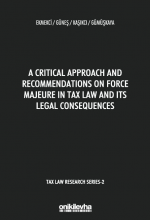 In this book, it is aimed to examine the concept of force majeure in terms of tax law. In this regard, the concept of force majeure in the process of taxation and in the process of tax proceedings is analyzed through a critical perspective. Moreover, the concepts of contingency and difficult status within the Tax Procedure Law no. 213 and their uncertain and non-systematic addressing in the aforementioned law are discussed. These concepts are also examined in terms of tax enforcement law and with respect to customs tax law and some suggestions are brought forward.(ARKA KAPAKTAN)
In this book, it is aimed to examine the concept of force majeure in terms of tax law. In this regard, the concept of force majeure in the process of taxation and in the process of tax proceedings is analyzed through a critical perspective. Moreover, the concepts of contingency and difficult status within the Tax Procedure Law no. 213 and their uncertain and non-systematic addressing in the aforementioned law are discussed. These concepts are also examined in terms of tax enforcement law and with respect to customs tax law and some suggestions are brought forward.(ARKA KAPAKTAN)
TABLE OF CONTENTS
I. COMMON EXPLANATIONS IN ALL BRANCHES OF LAW REGARDING THE CONCEPT OF DISASTER LAW AND FORCE MAJEURE
A. The Concept of Disaster Law
B. Common Explanations for All the Branches of Law with Respect to Force Majeure
1. Terminology Issues
2. Force Majeure in our Legislation
3. Characteristics of Force Majeure in the Doctrine and Practice
4. Distinguishing the Concept of Force Majeure from the Concept of Contingency
C. General Explanations with Respect to Force Majeure in Tax Law
II. FORCE MAJEURE IN TAX LAW IN TERMS OF THE PROCESS BEFORE LITIGATION
A. Provisions of the TPL regarding Force Majeure
1. Cases of Force Majeure in accordance with TPL
2. The Issue of with Which Liabilities the Cases of Force Majeure are Relevant
3. Burden of Proving Force Majeure
B. A Regulation that is Unnecessary and that may have Negative Consequences for the Taxpayers: "Difficult Status" included in Article 17 of the TPL
III. THE LEGAL CONSEQUENCES OF FORCE MAJEURE THAT OCCUR BEFORE AND AFTER LITIGATION INCLUDING THE FIELD OF CUSTOMS DUTY IN TAX LAW
A. General Explanations
B. The Effect of Force Majeure on Periods in the Process of Taxation in terms of the TPL and LPCPR
1. The Effect of Force Majeure on Periods included in Tax Procedure Law
2. Non-Prevention of Ex-Officio Imposition of Taxes due to Force Majeure
3. Abolition of Default Interest and Late Fee due to Force Majeure
4. Cancellation of Tax and Corresponding Penalties and Other Public Receivables due to Natural Disasters
C. Force Majeure in Our Customs Legislation, Its Legal Consequences Regarding the Process before Litigation, and Special Regulations in This Field with Respect to the Coronavirus Pandemic
IV. REGULATIONS IN TURKISH TAX LAW AND INTERNATIONAL TAX LAW PECULIAR TO CORONAVIRUS PANDEMIC, THE AUTHORIZATION OF MINISTRY OF TREASURY AND FINANCE TO DECLARE FORCE MAJEURE AND THE LIMITATIONS OF THIS AUTHORIZATION
A. General Explanations
B. Declaration of Force Majeure Regarding the Coronavirus Pandemic in Our Country, Special Regulations and Evaluation
1. General Communiqué with no 518
2. The Taxpayers and Sectors Excluded from the Scope of General Communiqué with no 518
C. Effects of Force Majeure with regard to International Tax Law
V. FORCE MAJEURE IN TAX PROCEEDINGS LAW AND ITS LEGAL CONSEQUENCES
A. Force Majeure in Tax Proceedings Law
1. General Explanations
2. Force Majeure in Tax Proceedings Law and the Problem of its Effect on the Periods (Phenomenon of Reinstatement)
VI. FORCE MAJEURE WITH REGARD TO TAX CRIMINAL LAW
A. General Explanations
B. Regulations of the TPL with respect to Force Majeure and Contingency
C. Effect of Force Majeure on Tax Criminal Law (Culpability)
CONCLUSION
BIBLIOGRAPHY
